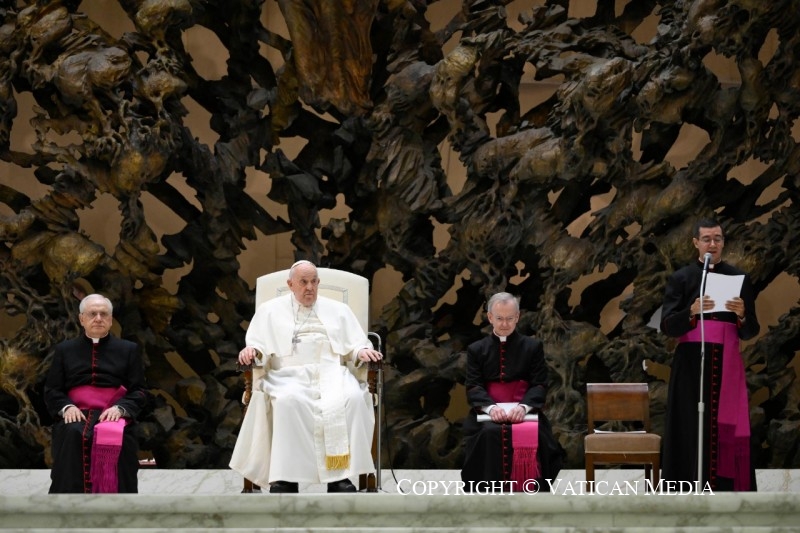Pope: anti-personnel mines continue to kill
Pope Francis' appeal 25 years after the entry into force of the Ottawa Treaty that banned them. At the Synod of Armenian Catholics the closeness to the Nagrono-Karabakh refugees. In the catechesis, reflection on the deadly vices of envy and vainglory.
Vatican City (AsiaNews) - Anti-personnel mines are "devious devices" that "continue to strike innocent civilians, especially children even many years after the end of hostilities," dennoucned Pope Francis again today at the end of his Wednesday general audience.
He was recalling that March 1 will mark the 25th anniversary of the entry into force of the Ottawa Treaty banning these weapons. An international agreement to which 164 countries of the world adhere, but not major powers such as the United States, Russia, China and India.
"I express my closeness to the victims of these devious devices," said Francis, "which remind us of the dramatic cruelty of wars and the price that civilian populations are forced to suffer. In this regard, I thank all those who offer their contribution to assist the victims and clean up the contaminated areas: their work is a concrete response to the universal call to be peacemakers by taking care of our brothers and sisters".
To this appeal he also joined the call not to forget "the peoples who are suffering because of the war: Ukraine, Palestine, Israel and many others. And let us pray for the victims of the recent attacks on places of worship in Burkina Faso," he added, "as well as the people of Haiti where crimes and kidnappings by armed gangs continue."
Shortly before - meeting with members of the Synod of the Patriarchate of Armenians of Cilicia, led by the Armenian Catholic Patriarch - he had also recalled those who fled Nagorno-Karabakh seeking refuge. "So many wars, so much suffering," he commented.
"The First World War was supposed to be the last and the States formed the League of Nations, the 'first fruits' of the United Nations, thinking that this was enough to preserve the gift of peace. Yet since then, how many conflicts and massacres, always tragic and always pointless. So many times I have pleaded: "Enough!". Let us all echo the cry for peace, that it may touch hearts, even those insensitive to the suffering of the poor and humble. And above all let us pray. I do it for you and for Armenia".
In the Paul VI Hall, Francis - still struggling to speak due to the flu syndrome - entrusted the reading of the text of the catechesis to Mgr Filippo Ciampanelli of the secretariat of state. Continuing his reflection on the vices and virtues today, he dwelt on the two capital vices that spiritual tradition calls envy and vainglory.
"The root of envy,' the pope observed, 'is the relationship of hate and love: one wants the other's evil, but secretly one wishes to be like him. The other is the epiphany of what we would like to be, and which in reality we are not. His good fortune seems an injustice to us: surely - we think - we would have deserved his successes or his good fortune much more'. But behind this is "a false idea of God: we do not accept that God has his own 'mathematics', different from ours. We would like to impose our selfish logic on God, instead God's logic is love. The goods He gives us are made to be shared."
Related to envy, however, is also vainglory: these are vices of 'a person who aspires to be the centre of the world, free to exploit everything and everyone, the object of all praise and love'. The boastful person "has no empathy and does not realise that there are other people in the world besides himself. His relationships are always instrumental, marked by the overpowering of the other. His person, his achievements, his successes must be shown off to everyone: he is a perpetual beggar for attention. And if sometimes his qualities are not recognised, then he gets fiercely angry. The others are unfair, they do not understand, they are not up to it."
How do we cure this evil? The pontiff noted that spiritual teachers do not suggest many remedies, because in the end the very praise the boastful person hoped to reap from the world will soon turn against him. "How many people, deluded by a false self-image, have then fallen into sins of which they would soon be ashamed," Francis commented. The most beautiful instruction,' the pontiff concluded, 'remains the testimony of St Paul, who asked the Lord three times to free him from that torment, receiving from Jesus the answer: "My grace is sufficient for you. And having understood that strength is fully manifested in weakness, he wrote in the Second Letter to the Corinthians: "I will therefore boast gladly of my weaknesses, that the power of Christ may abide in me" (2 Cor 12:9).
07/02/2019 17:28
12/02/2016 15:14







.png)










